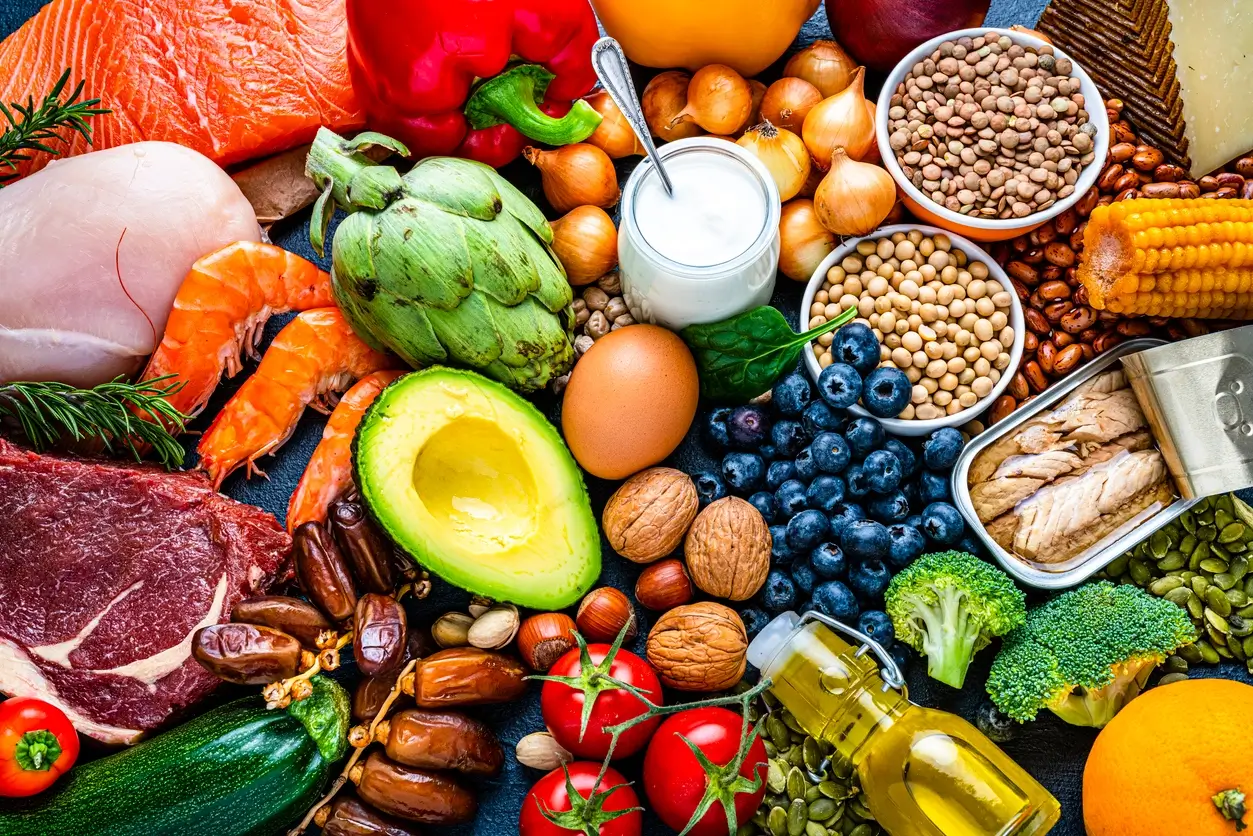Wegovy is something of a weight loss revolution. People are losing astounding amounts of weight on Wegovy. But if you think that taking a weekly dose of Wegovy is all you have to do, and then you can eat whatever you want and still lose weight — think again!
It has been well-documented that eating a properly planned diet while taking Wegovy is required to support its weight loss benefits, minimize possible side effects, and promote overall health and well-being. In the Wegovy clinical trials, the participants who lost the most weight – as much as 16% of their total body weight – did so when combining the drug with calorie restriction and a balanced, well-planned diet.
Once you have accepted the fact that changing your diet is all part of using medications like Wegovy correctly and effectively, you will be far more likely to reach your weight loss goals. Finding the right diet plan on Wegovy could seem challenging, but. don’t worry; our experts have already done all the work for you. Read on and discover which diets work best with Wegovy.
How Does Wegovy Work for Weight Loss?
Wegovy works by curbing your appetite, but it is not like any old-fashioned diet pill or typical “appetite suppressant.” Wegovy belongs to a class of drugs known as GLP-1 agonists that mimic the effect of Glucagon-like peptide-1 or GLP-1, which is a naturally produced hormone that regulates when you feel hungry or full.
You know that feeling when you say, “I can’t eat another bite,” that’s the effect of GLP-1. The hormone is released in response to a “full belly,” and it signals your brain that you are “stuffed” and do not need to eat anymore. The active ingredient in Wegovy binds to those same hormone receptor sites, so you feel full even when there is little or no food in your stomach, so you eat less at meals and throughout the day. Wegovy also slows digestion, so when you do eat a meal, food stays in your belly longer, which further helps you to stay satisfied for a greater length of time.
Wegovy doesn’t only work on your gut; it impacts your brain as well. It works on the receptors in your brain that make you feel like you want to eat. Our doctors like to tell patients that it quiets the “food noise” — that constant little voice in your head that tells you to eat something and keeps you thinking about food, even when you are not really hungry. In this same way, we have found that Wegovy acts on the brain by actually “reprogramming” your cravings for salty or sugary foods. It also interacts with your body’s other “hunger hormones,” counteracting the hunger-inducing effects of Ghrelin and leptin. Thanks to these combined effects, Wegovy provides substantial and long-lasting weight loss.
It takes time for your body to get used to the presence of Wegovy, but over time, you will lose weight, particularly when you combine your once-weekly injections of Wegovy with exercise and a properly planned diet.
You will likely notice the appetite-suppressant effects of Wegovy in the first few weeks of taking it. In the Wegovy clinical trials, participants started to see significant weight loss within the first 20 weeks of being on Wegovy; maximum sustained weight loss was achieved in 68 weeks. Over the course of that time, participants lost about 6% at 3 months and 11% at 6 months.
What to Eat on Wegovy?
Study after study has shown that Wegovy works best when it is combined with not only caloric reduction but also eating a diet that is rich in lean protein, vegetables, fibre, whole grains, and healthy fats.
There is no fixed “rule” as to how many calories you should eat while on Wegovy each day. However, we have found that patients tend to do best when eating a balanced diet of no more than 1000 to 1200 calories per day. Our doctors have found, and the medical literature tends to agree, that as important as how much you eat is what you eat while on Wegovy. The consensus is the most important thing to eat while on Wegovy is adequate amounts of lean protein.
Protein is your body’s main source of essential amino acids. Your body cannot make or store amino acids, so it must get them from the foods you eat, and protein is primarily made up of amino acids. After proteins, the next most important food to have in your Wegovy diet plan are vegetables, followed by fruits, whole grains, and healthy fats.
Best Foods to Eat While Taking Wegovy
Protein
Lean protein is one of the most important nutrients for you to eat while taking Wegovy. Protein is essential to the strength, growth, and repair of your muscles and every other tissue in your body. Since you will be eating less, it is essential that you boost your intake of lean protein to keep your body strong and healthy while on Wegovy. Protein-rich foods are also low in carbohydrates and sugar, which helps keep your blood sugar balanced and promotes weight loss.
You should aim for about 25 to 30 grams per meal and at least 8-10 grams per snack. Here is a list of high-protein snacks for some ideas. Visit a registered dietitian to determine your individual protein needs. Fish, greek yoghurt, tofu, skinless white poultry, nuts, and legumes are all great sources of protein for meals and snacks.
Fruits and Vegetables
Your mom always said to “eat your veggies,” and she was 100% right. Eating fruits and veggies is important in any diet, but it is essential when you are on Wegovy. Fruits and veggies have a lot of fibre, which will make you feel fuller, enhancing the appetite-suppressing effects of Wegovy, and the high fibre may also help to mitigate some of the gastrointestinal side effects common with Wegovy. Furthermore, most fruits and vegetables are high in vitamins and minerals that are essential for your overall health and well-being while taking Wegovy.
Whole grains
Like fruits and vegetables, whole grains are rich in fibre, which gives them a high satiety factor, meaning they make you feel fuller longer and again, fibre-rich foods can serve as a counterbalance to constipation and some of the other digestive side effects of Wegovy.
Fibre-rich whole grain foods include whole wheat, whole wheat bulgur, whole wheat couscous, spelt, brown rice, oat groats, steel-cut oats, rolled oats, buckwheat, and quinoa.
Fibre
Fibre is so important while taking Wegovy, not only because it can help you feel satisfied longer, but because having more fibre in your diet can help mitigate many of the possible gastrointestinal side effects of Wegovy. Other than the whole grains, fruits, and veggies mentioned above, other sources of fibre include…beans, peas and lentils, berries, and nuts.
Healthy Fats
Not all fats are bad, and you should include “good fats” while eating Wegovy. Good fats are monounsaturated fat and polyunsaturated fat. Monounsaturated fats are found in olive oil, almonds, cashews, peanuts, and avocados. Polyunsaturated fats are found in oily fish like salmon, herring and mackerel, walnuts, flaxseed, and canola oil.
Adding “good fats” to your diet while on Wegovy not only enhances its satiety effects, but these fats can also help you better manage your cholesterol levels.
What Diet Works Best With Wegovy?
While there is no specific “Wegovy Diet,” healthy diets, such as the Mediterranean Diet or DASH Diet, tend to be the best for people on Wegovy, while other diets like Keto, though popular, may not be a good choice for people on Wegovy. As we break down each of these diets later in this section, you will see why.
The diet that will work best along with Wegovy injections will vary from patient to patient. Generally speaking, diets that have proven to be effective for weight loss without taking Wegovy will be that much more effective and perhaps easier to stick to when combined with the appetite-curbing effects of Wegovy. Let’s take a look at some popular diet plans and which work best with Wegovy.
Intermittent Fasting or IF
In intermittent fasting, you only eat during a specific time. Research shows fasting for a certain number of hours each day or eating just one meal every few days can help you lose weight. Wegovy, with its appetite suppressant abilities, naturally encourages intermittent fasting, and if you want to try a specific intermittent fasting regimen, being on Wegovy makes it a lot easier to do so. Research has shown that IF results in weight loss because it helps you decrease how much you eat each day – and that is exactly what Wegovey does!
Mediterranean Diet
The Mediterranean diet has been identified as a great one for weight loss and a “heart-healthy” diet. With its emphasis on fruits, veggies, whole grains, and healthy fats like olive oil, the Mediterranean diet focuses on foods that will keep you fuller for longer, which makes it a perfect match for people taking Wegovy. Enumable studies have found that the Mediterranean Diet can improve heart health, lower cholesterol, decrease high blood pressure, and lower blood sugar levels.
Keto Diet
The Ketogenic or Keto diet emphasizes low carbs and high fat. Carbohydrates are your body’s main source of fuel or energy. The theory behind the Keto diet is that by severely limiting your carb intake, you force your body into a state of “ketosis,” where it supposedly turns fats into ketones and burns them for fuel instead of carbohydrates. There is much debate on whether this hypothesis is correct or not. Given the recommendations for whole grains while on Wegovy and the effects that Wegovy has on glucose metabolism, Keto is probably not a good choice when taking Wegovy.
DASH Diet
“DASH” stands for Dietary Approaches to Stop Hypertension, and it is a diet designed to restrict salt intake to combat high blood pressure. One look at the DASH diet, and you will quickly see that it emphasizes all of the foods we suggested earlier that you eat while on Wegovy. The cornerstones of the DASH diet are fruits, vegetables, beans, whole grains, low-fat dairy products, and lean proteins like chicken and fish. Sound familiar? Like the Mediterranean Diet, the DASH diet is an ideal one to follow while on Wegovy, and since many patients taking Wegovy may have high blood pressure, they may already be or should be, on the DASH Diet.
Vegan or Plant-Based Diet
Plant-based diets encourage you to eat more fruits, vegetables, beans, whole grains, nuts, and vegetable oils. As mentioned above, we advise people on Wegovy to eat more fruits and veggies, but going entirely animal product-free, such as completely Vegan, may not be the best choice for Wegovy patients as it may make it difficult or impossible to get the necessary protein.
How to Stick to a Diet Plan
Once you and your doctors decide which diet plan is best for you, we know that even while on Wegovy, sticking to any diet can still be challenging. Here are some tips to help.
Get Enough Sleep – Getting enough sleep every night — 7 to 8 hours each night – is not only good for overall health, but it can also help in weight loss by keeping you energetic and your hormones related to weight and fat metabolism like testosterone and HGH high.
Other professionals
Of course, our doctors will help guide you every step of the way on Wegovy, but you may also want to seek the advice of a registered dietitian or a behavioral counselor who can help you rethink your relationships with food.
Support Groups
Similar to seeking help from professionals, getting help from others, like joining a weight loss support group, can help you face challenges, set goals, and stay motivated.
Set Achievable Goals
Speaking of goals, it is best to set small weight loss goals. Setting achievable goals lets you move from milestone to milestone and stay on track!
Surround Yourself with Healthy Food
If you do not have any junk food in your house, you won’t be tempted to eat it! Get rid of chips, cookies, pastries, and candy, and instead surround yourself with healthy foods like fruits, nuts, and vegetables.
Drop the “All or Nothing” Attitude
In dieting, the “all or nothing attitude” goes something like this, “well, I already screwed up today by grabbing the donuts they had in the break room, so I may as well have a Big Mac for lunch; this day is already shot.” No, it isn’t; you need to take each food choice on its own. If you make one bad choice, do not let it influence the rest of your day. Similarly, if you have eaten right for breakfast and lunch, that doesn’t mean you should go pig out for dinner.
Monitor Your Progress
As mentioned above, a support group or a dietician can help you monitor your progress; however, if you are not availing yourself of either, self-monitoring is still important. Self-monitoring can mean keeping a detailed diet journal or using a Fitbit or other fitness device or smartphone app to monitor progress. Remember, too, that tracking progress on a diet plan doesn’t only mean monitoring the pounds you may have lost. Ask yourself questions like “Do I feel better?” “Do I look better,” “Am I being more sociable than I was before I started?” “Do I have more self-esteem?”
If the answer is “yes,” you ARE making progress despite the pounds you may or may not have lost.



